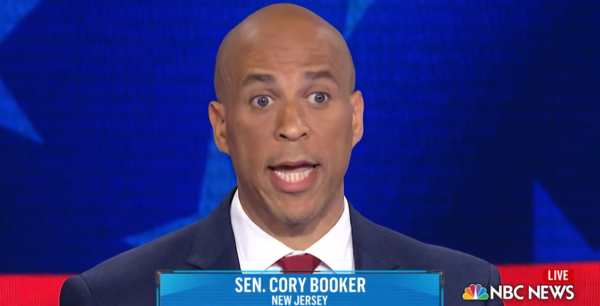
Democrat presidential hopeful Sen. Cory Booker took a swipe at rival Pete Buttigieg, mayor of South Bend, Ind., for what many in the Second Amendment community would define as a moment of complete honesty when Buttigieg described a “gun buyback” proposal as “confiscation,” according to the National Review.
Booker, the New Jersey anti-gunner, declared in a message on Twitter, “Calling buyback programs ‘confiscation’ is doing the NRA’s work for them, and they don’t need our help,” National Review reported.
Buttigieg isn’t the only person to suggest that “buyback” programs, especially mandatory ones, are confiscation. Gun rights activists call it “compensated confiscation.” While a gun owner is at least partly reimbursed for their property, they still must surrender firearms or face legal consequences. But not calling them that amounts to “camo-speak,” using terms to disguise the true intent, such as substituting “gun safety” or “gun responsibility” for gun control.
Buttigieg reportedly made the reference during an interview on a Snapchat show Good Luck America.
Gun confiscation has been a hot button issue since former Texas Congressman Robert Francis “Beto” O’Rourke blurted during the summer Democrat debate, “Hell, yes, we’re going to take your AR-15, your AK-47.” It was a defining moment in the campaign, according to Alan Gottlieb, chairman of the Citizens Committee for the Right to Keep and Bear Arms, because none of the other Democrats on stage at the time raised so much as an eyebrow, not to mention an objection. O’Rourke’s heat-of-the-moment remark and the silence of other candidates boxed the entire Democratic party into a corner, elevating them from “the party of gun control” to the “party of gun confiscation,” Gottlieb said at the time.
The Booker-Buttigieg controversy erupts as another far-left Democrat, California Gov. Gavin Newsom, just signed legislation expanding the scope of the Golden State’s “red flag” law. Under the new legislation, according to the Sacramento Bee, “Coworkers, employers and school faculty will be able to petition a court for a gun violence restraining order against individuals they think pose a harm to themselves or the community.”
Newsweek noted that, “The new measure—which will take effect from January 1, 2020—is part of 15 gun-related laws that Newsom has backed. The sweeping new package of gun legislation includes a companion bill which ensures that the gun violence restraining orders can span up to five years.”
But the American Civil Liberties Union opposed the law, saying it “poses a significant threat to civil liberties” as it allows employers, co-workers, teachers and those covered under the existing measure to seek the gun violence restraining order without first allowing the owner an opportunity to contest and make their case.”
“Red flag” laws are popular with Democrats, but in then firearms community there are serious concerns about the lack of due process. A person served with a “red flag” Extreme Risk Protection Order (ERPO) is considered guilty until he/she is able to appear in court days later to argue their innocence.
In the meantime, those persons are still free and they could, if truly a threat to public safety or themselves, do some harm. The ERPO laws seem more designed to seize firearms than provide help to someone who needs it.